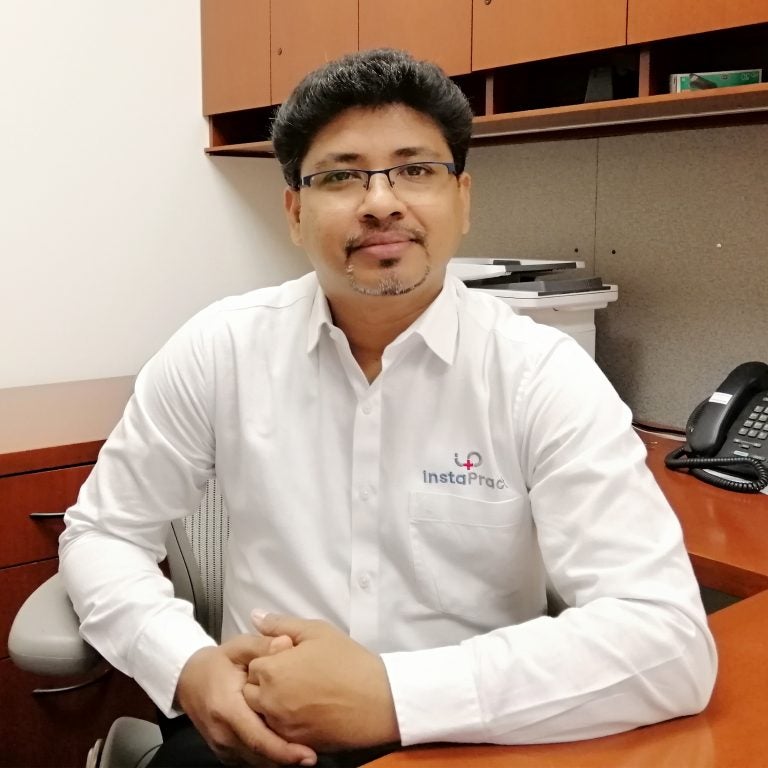Dubai-Based Telehealth Startup InstaPract Helps Patients Consult Doctors From A Distance During COVID-19 Pandemic InstaPract's white-label telemedicine platform allows hospitals, clinics and entrepreneurs to offer HIPAA-compliant video consultation with payment integration to their clients using web, Android or IOS devices.
By Megha Merani
Opinions expressed by Entrepreneur contributors are their own.
You're reading Entrepreneur Middle East, an international franchise of Entrepreneur Media.

Can a visit to the doctor ever be complete without them pulling out a stethoscope to listen to your heart and lungs, pressing down on parts of your abdomen, and of course tell you to open your mouth and "say ahhhh'?
The routine of poking and prodding during a physical exam has long represented the essence of the doctor-patient relationship– the reassurance and comfort of healing care through human touch.
And then came the novel coronavirus (COVID-19).
As people across the world were forced into a lockdown and urged to socially distance to curb the outbreak, the World Health Organization and other health authorities also called for "medical distancing' to minimize physical contact between patients and healthcare providers in order to limit exposure and transmission as well as allocate hospital capacity to more critical cases.
And while not a solution to the emergency, telemedicine has fast become an essential part of the response to the outbreak.
"Before COVID-19, a Dubai-based hospital with whom we started to work did not have a telehealth program," Jijo James, co-founder of InstaPract HealthTech IT Solutions, tells Dubai Startup Hub.
"Within a span of three weeks we kicked off this program with the help of a telecommunications partner [enabling] patients to continue with their basic medical consultation in spite of the precarious situation due to the pandemic, thus staying safe."

Jijo James, co-founder of InstaPract HealthTech IT Solutions
Founded by James and cofounder Michael Allwyn in 2019, InstaPract's white-label telemedicine platform that allows hospitals, clinics and entrepreneurs to offer Health Insurance Portability and Accountability Act of 1996 (HIPAA)-compliant video consultation with payment integration to their clients using web, Android or IOS devices. The platform is compliant with international standards for transfer of clinical and administrative data between software applications including Health Level Seven (HL7v2) and Fast Healthcare Interoperability Resources (FHIR) to ensure interoperability of health information.
Last month, the Dubai Health Authority suspended all elective surgeries, physiotherapy, osteotherapy and alternative medicine sessions until further notice as part of precautionary measures. The regulator told hospitals to consult chronic patients of heart, hypertension and other diseases remotely through telemedicine. Only patients with acute infections, injuries or those requiring life saving surgery are to be permitted into the facilities.
James says the Dubai-based hospital using InstaPract's telemedicine platform has recorded more than 700 successfully completed virtual consultations in just the four weeks post-implementation.
"The patients who used the platform were reaching out for primary care physicians, pediatric care, dermatology, chronic diseases and post-procedure followups," he adds.
Distance clinical care has been available for years but has not gained mainstream popularity. But the model's role in the pandemic is likely to make it an assured part of the future, James predicts, especially for routine visits as more patients opt to sign in for their online consultation rather than pace in the doctor's waiting room.
"Telemedicine or telehealth [has] existed [for some time] but people were not aware of its importance or its benefits," he says.
"It was a buzz word [or] a feather in the cap to the providers or hospitals offering the service. However, in recent years there has been a gradual shift in its favor. Patients are now pushing the clinics and hospitals for virtual visits. The visionaries who were earlier not convinced on the success of this model, or that telehealth can bring return on investment, are now beginning to realize that without such digital platforms clinics can go out of business in present circumstances."
Instapract's collaboration with hospital partners in the UAE came about through applying to Dubai Chamber's Market Access program as well as through introductions facilitated by Dubai Startup Hub, Allwyn adds.
"They have introduced us to all the right people and really helped us with growing our network a lot faster than we could have managed by ourselves," he says.

Michael Allwyn, co-founder of InstaPract HealthTech IT Solutions
With the immense pandemic-driven pressure mounting on companies to look for immediate solutions outside their walls, Dubai Startup Hub's Market Access program is playing a crucial role in helping large firms identify innovative startups that help overcome their business lifespan challenges. The program is a unique platform that facilitates collaboration between innovative startups and successful corporations to address their key business challenges, create value and bring new possibilities for their businesses to thrive.
Market Access enables corporates to give young businesses the means and access to market to launch their products and services, and in turn startups offer new ideas and solutions to solve key challenges faced by prominent companies in the emirate. The program offers a chance not only for startups to gain the leverage they need to succeed, but for corporations to drive innovative change at the core of the organization rather than merely on a surface level.
Allwyn says, the pandemic-driven acceleration has also created positive awareness of telehealth among medical professionals. This includes finally shifting the mindset, particularly of those who have long been skeptical of the approach over traditional in-person examinations.
"COVID-19 has changed the face of world healthcare," he adds.
Of course, the optimistic view of virtual visits is not without its challenges.
"Medical insurance reimbursement for telemedicine visits has been a major challenge," Allwyn says. "However, we are observing that more and more insurance companies are covering tele-consultations during the current situation."
But the challenges also present a new "domain of unlimited opportunities" for startups especially in the realm of artificial intelligence and data analysis, Allwyn insists.
After all, seeing your doctor is now about opening your app and saying "ahhh'.
This article was originally published on Dubai Startup Hub and has been reposted on Entrepreneur Middle East based on a mutual agreement between the websites.











